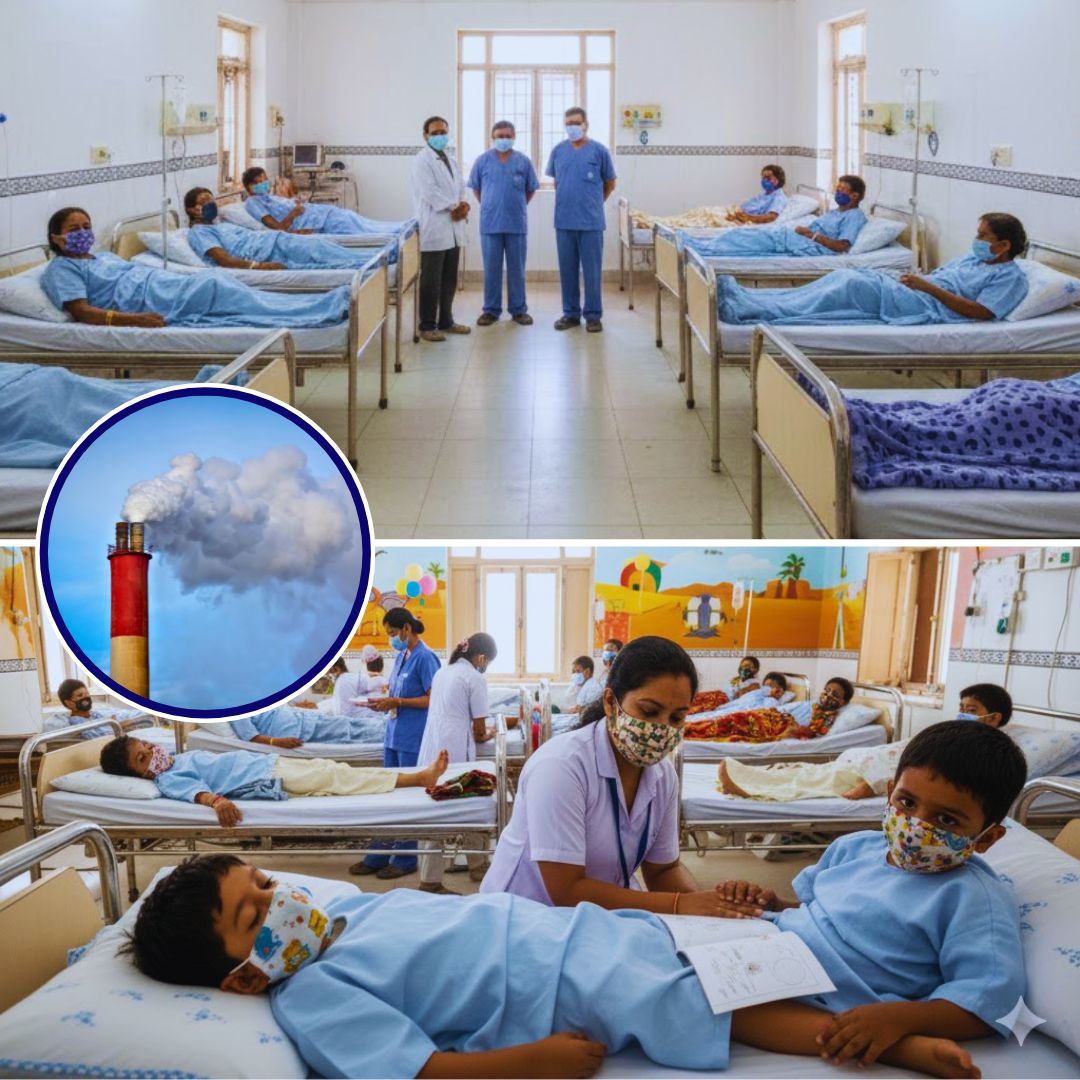At least 23 people, including 16 children, were hospitalised in Rajasthan’s Sikar district after inhaling toxic fumes near an industrial area on Sunday, sparking urgent health concerns and an official investigation.
The incident caused breathlessness, dizziness, and other respiratory distress symptoms among residents, particularly children from neighbourhoods around Lal Bahadur School and nearby settlements.
While most of those affected have been discharged after medical treatment, a few remain under observation, and one elderly woman tragically passed away due to complications linked to the toxic air exposure.
Authorities attribute the event to the burning of clothes in a furnace and possible chemical emissions from local factories, intensifying calls for stricter pollution control measures.
Incident and Immediate Response
The toxic fumes reportedly began spreading late Saturday evening in Sikar’s Shanti Nagar industrial area, engulfing residential localities often plagued by thick smoke and pollution. Residents initially mistook the smoke for fog but soon developed severe symptoms such as coughing, chest burning, eye irritation, and difficulty breathing.
Approximately 22 individuals, including schoolchildren and adults, were rushed to Government SK Hospital for emergency care.
Dr Shivpal Singh, attending physician at SK Hospital, confirmed the majority of patients received oxygen support and nebuliser treatment, and the overall condition of admitted individuals is stable.
In response, Sikar Additional District Magistrate (ADM) Ratan Lal Swami assured the public that swift action was underway. “The children brought here are nearly fine.
We are investigating the matter thoroughly with the Pollution Control Board deployed at the site,” he said, emphasizing that the preliminary investigation points to burning clothes in furnaces as the cause of the hazardous fumes.
The regional pollution control authorities are collecting local air and residue samples to identify the exact sources and will determine responsibility based on their reports.
Health and Community Impact
The incident has highlighted the vulnerability of children and elderly residents to industrial pollution in Sikar’s expanding urban-industrial landscape. Hospital doctors noted while most children responded well to treatment and were discharged, some remain under careful observation.
The death of an elderly woman from respiratory distress has heightened fears among locals, underlining the potentially lethal consequences of unchecked air pollution.
Many residents voiced grievances about recurrent exposure to smoke and noxious gases, especially during late evening hours, linked to nearby factories involved in metal and chemical processing, and the burning of industrial waste such as discarded clothes.
Community members express ongoing anxiety about air quality volatility, despite the official air quality index (AQI) for Sikar being ‘Moderate’ with a value of 172 according to the Central Pollution Control Board.
The mismatch between recorded air quality data and residents’ health experiences raises questions about monitoring efficacy and timely regulatory intervention.
Repeated complaints about emissions from industrial furnaces and chemical processes have gone unaddressed for years, according to locals, exacerbating mistrust of industrial operators and officials.
Industrial Pollution in Rajasthan: Context and Challenges
Rajasthan has witnessed several pollution-related accidents and rising environmental health challenges as industrialisation expands. In many districts, including Sikar, textile, metal processing, and chemical plants operate with minimal pollution safeguards, endangering nearby communities.
A 2025 Supreme Court ruling criticised delayed and insufficient state action against industrial pollution, urging accelerated and transparent remedial efforts.
Incidents like the Sikar toxic fumes emergency spotlight the urgent need to enforce stringent environmental norms, better pollution monitoring infrastructure, and a robust dialogue between industries, residents, and authorities.
In Sikar, local officials face the difficult task of balancing industrial growth against public health priorities. The burning of clothes in furnaces and chemical mixing for metal separation are common practices in some factories, contributing to hazardous emissions.
Seasonal weather patterns and topography can worsen pollutant concentration, putting already at-risk groups under significant health stress.
Experts stress the importance of comprehensive risk assessments and community-inclusive action plans to prevent recurrence of such toxic air episodes.
The Logical Indian’s Perspective
The Sikar toxic fumes incident is a stark reminder of the human cost of lax industrial oversight and environmental negligence. The Logical Indian calls upon policymakers and industries to prioritise health safeguards for vulnerable populations by instituting transparent investigations and swift corrective measures.
We reaffirm the need for sustainable development models that harmonise economic growth with the well-being of communities.
Pollution control is not merely an administrative obligation but a moral imperative towards peaceful coexistence and shared progress.











